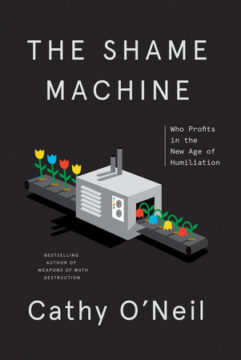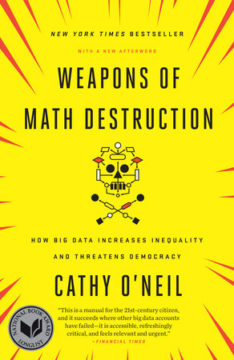by Danielle Spencer

Cathy O’Neil’s The Shame Machine: Who Profits in the New Age of Humiliation (Crown) was released on March 22, 2022. O’Neil is the author of the bestselling Weapons of Math Destruction: How Big Data Increases Inequality and Threatens Democracy (Crown 2016) which won the Euler Book Prize and was longlisted for the National Book Award. She received her PhD in mathematics from Harvard and has worked in finance, tech, and academia. She launched the Lede Program for data journalism at Columbia University and recently founded ORCAA, an algorithmic auditing company. O’Neil is a regular contributor to Bloomberg Opinion.
Danielle Spencer: Can you speak a bit about your background and what led you to write this book?
Cathy O’Neil: I’m a mathematician and a child of two mathematicians. Very nerd-centered childhood, where science was the religion of the household. They were otherwise atheists. I became a data scientist at some point, also a hedge fund analyst.
 And then I started trying to warn people about the dangers of algorithms when we trust them blindly. I wrote a book called Weapons of Math Destruction, and in doing so I interviewed a series of teachers and principals who were being tested by this new-fangled algorithm called the value-added model for teachers. And it was high stakes. They were being denied tenure or even fired based on low scores, but nobody could explain their scores. Or shall I say, when I asked them, “Did you ask for an explanation of the score you got?” They often said, “Well, I asked, but they told me it was math and I wouldn’t understand it.”
And then I started trying to warn people about the dangers of algorithms when we trust them blindly. I wrote a book called Weapons of Math Destruction, and in doing so I interviewed a series of teachers and principals who were being tested by this new-fangled algorithm called the value-added model for teachers. And it was high stakes. They were being denied tenure or even fired based on low scores, but nobody could explain their scores. Or shall I say, when I asked them, “Did you ask for an explanation of the score you got?” They often said, “Well, I asked, but they told me it was math and I wouldn’t understand it.”
That was the first moment I thought, “Oh my God, shame is so powerful.” That was math shame, evidently, because it wouldn’t have worked on me. [laughs] I’m a mathematician. You’re not going to shame me on math. If you tell me I wouldn’t understand something because it’s math, I’d say, “Dude, buster, if you can’t explain it to me, that’s your problem—not mine.” I would just be bulletproof to math-shaming. Read more »

 Obviously, “Donald Trump” here is a placeholder for any political figure who one wishes to insult. But the joke raises an interesting question. What kind of work , if any, is shameful? And it also suggests a way of posing the question: viz. what kind of work might a child be ashamed to admit that their parents performed? This is an interesting dinner table conversation topic.
Obviously, “Donald Trump” here is a placeholder for any political figure who one wishes to insult. But the joke raises an interesting question. What kind of work , if any, is shameful? And it also suggests a way of posing the question: viz. what kind of work might a child be ashamed to admit that their parents performed? This is an interesting dinner table conversation topic.